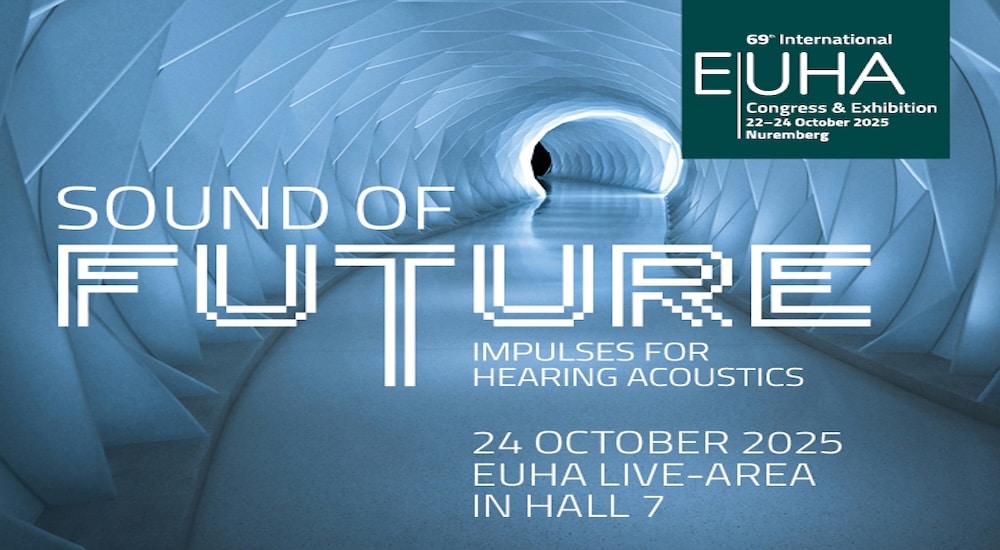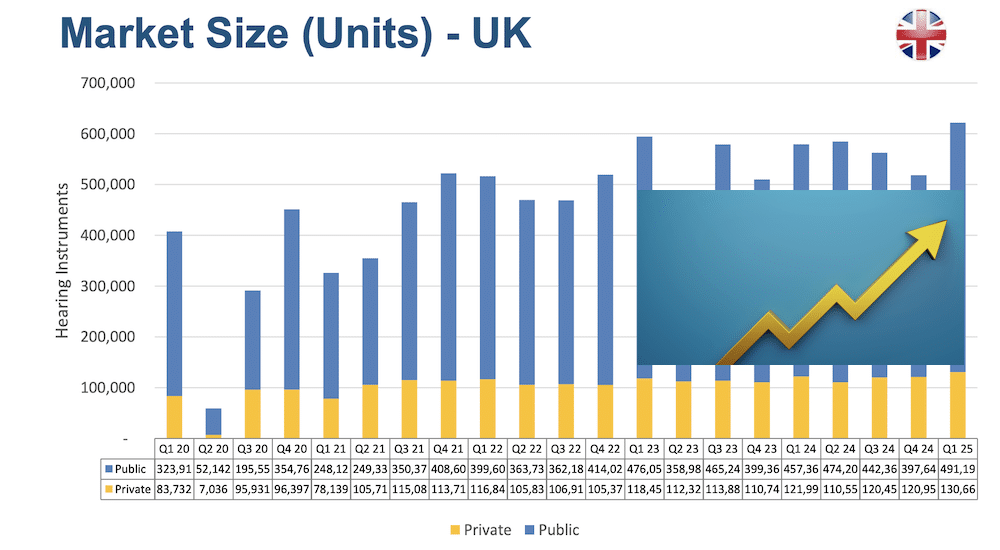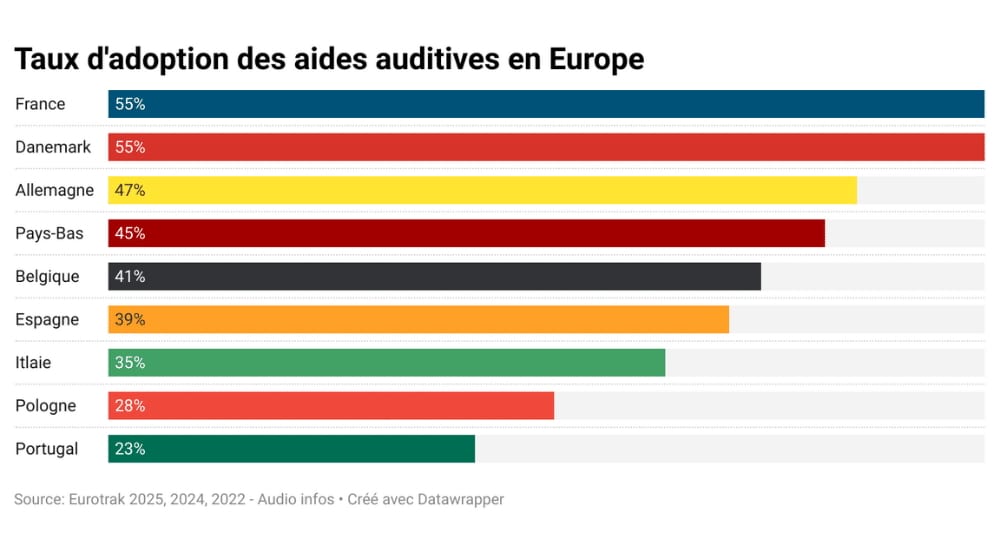BIHIMA's PAUL SURRIDGE - on 2021
UK Audiology
Be ambassadors for hearing health, urges Paul Surridge, Chairman of BIHIMA (The British and Irish Hearing Instrument Manufacturers Association), s he reflects on a year of advancements in research and technology, and what they mean for us over the festive season.

The development and roll-out of vaccines was a remarkable feat, in the wealthiest countries. It does worry me enormously that we have only scratched the surface when it comes to immunising the rest of the world. The winter season prompts us to think of others less fortunate, and to commit to making a positive, tangible impact on another human being.
Hearing devices at service of humanity
It has been 80 years since Einstein famously distanced himself from his own theoretical contribution to nuclear development with the bitter riposte, “It has become appallingly obvious that our technology has exceeded our humanity.” 2021, I hope, has seen a reversal in that prognosis, as technology has been put to service humanity on a global scale, like never before. It is certainly true within the world of hearing devices.
The success of remote provision, advancements in rechargeable batteries, a focus on family-centred care and new research into the comorbidities of hearing loss and early-onset dementia have all accelerated us forward. The most remarkable developments, for me, are the innovations our members have and are continually making with the technology.
The move to remote audiology
An example of this, as a result of the pandemic, is the switch from face-to-face to remote provision. We have been working towards moving medical care online, as an industry, for some time, but lockdown restrictions gave it the push it needed.
Phenomenal advances have been made in a short window of time, advances that will have far-reaching benefits for audiology services in the future. Our members worked with audiologists to swiftly move the fitting, servicing, and supply of hearing instruments online. We saw impressive creativity and technology solutions that ensured the delivery of safe clinical services.
But remote provision has not been without some unique complications. Audiologists have had to surmount challenges others in the medical world have not had to face, such as communicating with someone with hearing loss over Zoom. Remote provision is a significant transition, it worked and continues to be successful.
Return to growth
It is great, too, that we’re returning to measurable growth in hearing instrument sales and fittings, with numbers in the private sector in fact exceeding pre-pandemic figures. Yet we do have the worrying backlog of those unable to access hearing care and who are now on extended NHS waiting lists. There is still more to do to reach enough people whose lives could be transformed by the help our hearing devices provide.
Battery advances
Transforming, also, is the field of rechargeable batteries (no pun intended). Over the last year, the sustainability of batteries, as a global topic, has come to the fore. For our users, the issue is even more personally pertinent. They want to hear well all the time, perhaps never taking out the device. Demand grows for a discreetly-sized hearing instrument with continuous battery life.
A fantastic technology sector
But be not daunted. As we mull over the passing year, I invite you to take a moment to remember what a progressive industry we’re in, to appreciate the incredibly advanced technology involved in hearing instruments, which need to be so small yet still effectively process the complexities of brain functionalities. We’re always advancing and I believe this is a fantastic technology sector to be working in, one that actually improves lives. As customers adopt more tech, becoming more responsive to health-monitoring wearables, we have a huge opportunity ahead of us for the next generation encountering hearing loss.
While we eagerly look towards developments for future generations, let us not forget those still very much with us. 2021 has highlighted the efficacy of family-centred care. Manufacturers and audiologists alike have been exploring how best to bring the family into the process of setting up, monitoring, and working the technology. By initiating a support buddy system with a family member, remote provision regains its personal touch. The frequency with which we can now check in has huge implications for providing a truly bespoke experience. Over the festive season, as users enjoy noisy social gatherings, live music and shopping in busy stores, audiologists can receive the precise feedback they need to be able to tune devices to individual lives. By tuning in on-site, real world environments can be observed and adapted to. It’s a deeply sophisticated and appropriate use of technology in service to humanity.
Family support
As we look forward to a seasonal break during which we can indulge each other in person again, younger family members can play a crucial role in improving their loved ones’ lives. Identifying hearing loss early is vital. I was hugely impressed with the work that the University of Oxford and others embarked upon this year, that reinforced the link with hearing loss and dementia, cognitive decline, and isolation. In a way, their conclusions did not come as a surprise to me. I’m not a scientist or medic, but when I thought about the people I knew with hearing loss, it seemed obvious to me that their lives had been impacted if for no other reason than their ability to communicate was lessened.
My hope is that the Oxford, and other similar research worldwide, has the effect of encouraging those with hearing loss and their loved ones to seek assistance. Next step is to prove the missing link: that hearing instruments solve these life-limiting prognoses. What we can do, now, is make others aware of the comorbidity of hearing loss and isolation. Once you explain to a family member that hearing loss has been proved to bring on early dementia in those with a disposition, and will even accelerate its early onset, there’s no argument. The health implications go beyond social isolation into actual, cognitive affect. We as manufacturers and audiologists have a duty of care to continue to push this issue. Time with family offers us all an invaluable opportunity to observe, and to educate.
Reach out to the elderly
While the festive break provides us with the ideal opportunity to do so, other faiths of course have their own celebratory calendar. I have always admired cultures that more readily embrace and respect the elderly and care for them in old age. It would be wonderful if all of us who have the capacity to do so reached out to an elderly member in our community offering to share our care, concern and celebrations with them.
Indeed, I encourage all those people working in the sector worldwide to reach out to as many people as possible to spread the word that hearing health at every stage of our lives is essential, if we are to avoid the pitfalls of early onset dementia, cognitive decline, and loneliness in later life.
We have incredibly talented people working in the manufacturing sector and the profession. I think we all have a responsibility not to just do our jobs, but to act as ambassadors promoting hearing health wherever and whenever we have an opportunity to do so. We must stay curious about those most familiar to us, to continue to be of service to them and make use of our technological inventions and innovations. To end with another Einstein epigram, “The important thing is not to stop questioning. Curiosity has its own reason for existence.”
Source: Audio Infos UK #145 – November/December 2021




